Hongyi Jin
Axe: A Simple Unified Layout Abstraction for Machine Learning Compilers
Jan 27, 2026Abstract:Scaling modern deep learning workloads demands coordinated placement of data and compute across device meshes, memory hierarchies, and heterogeneous accelerators. We present Axe Layout, a hardware-aware abstraction that maps logical tensor coordinates to a multi-axis physical space via named axes. Axe unifies tiling, sharding, replication, and offsets across inter-device distribution and on-device layouts, enabling collective primitives to be expressed consistently from device meshes to threads. Building on Axe, we design a multi-granularity, distribution-aware DSL and compiler that composes thread-local control with collective operators in a single kernel. Experiments show that our unified approach can bring performance close to hand-tuned kernels on across latest GPU devices and multi-device environments and accelerator backends.
Mirage Persistent Kernel: A Compiler and Runtime for Mega-Kernelizing Tensor Programs
Dec 22, 2025Abstract:We introduce Mirage Persistent Kernel (MPK), the first compiler and runtime system that automatically transforms multi-GPU model inference into a single high-performance megakernel. MPK introduces an SM-level graph representation that captures data dependencies at the granularity of individual streaming multiprocessors (SMs), enabling cross-operator software pipelining, fine-grained kernel overlap, and other previously infeasible GPU optimizations. The MPK compiler lowers tensor programs into highly optimized SM-level task graphs and generates optimized CUDA implementations for all tasks, while the MPK in-kernel parallel runtime executes these tasks within a single mega-kernel using decentralized scheduling across SMs. Together, these components provide end-to-end kernel fusion with minimal developer effort, while preserving the flexibility of existing programming models. Our evaluation shows that MPK significantly outperforms existing kernel-per-operator LLM serving systems by reducing end-to-end inference latency by up to 1.7x, pushing LLM inference performance close to hardware limits. MPK is publicly available at https://github.com/mirage-project/mirage.
POSE: Phased One-Step Adversarial Equilibrium for Video Diffusion Models
Aug 28, 2025



Abstract:The field of video diffusion generation faces critical bottlenecks in sampling efficiency, especially for large-scale models and long sequences. Existing video acceleration methods adopt image-based techniques but suffer from fundamental limitations: they neither model the temporal coherence of video frames nor provide single-step distillation for large-scale video models. To bridge this gap, we propose POSE (Phased One-Step Equilibrium), a distillation framework that reduces the sampling steps of large-scale video diffusion models, enabling the generation of high-quality videos in a single step. POSE employs a carefully designed two-phase process to distill video models:(i) stability priming: a warm-up mechanism to stabilize adversarial distillation that adapts the high-quality trajectory of the one-step generator from high to low signal-to-noise ratio regimes, optimizing the video quality of single-step mappings near the endpoints of flow trajectories. (ii) unified adversarial equilibrium: a flexible self-adversarial distillation mechanism that promotes stable single-step adversarial training towards a Nash equilibrium within the Gaussian noise space, generating realistic single-step videos close to real videos. For conditional video generation, we propose (iii) conditional adversarial consistency, a method to improve both semantic consistency and frame consistency between conditional frames and generated frames. Comprehensive experiments demonstrate that POSE outperforms other acceleration methods on VBench-I2V by average 7.15% in semantic alignment, temporal conference and frame quality, reducing the latency of the pre-trained model by 100$\times$, from 1000 seconds to 10 seconds, while maintaining competitive performance.
WebLLM: A High-Performance In-Browser LLM Inference Engine
Dec 20, 2024

Abstract:Advancements in large language models (LLMs) have unlocked remarkable capabilities. While deploying these models typically requires server-grade GPUs and cloud-based inference, the recent emergence of smaller open-source models and increasingly powerful consumer devices have made on-device deployment practical. The web browser as a platform for on-device deployment is universally accessible, provides a natural agentic environment, and conveniently abstracts out the different backends from diverse device vendors. To address this opportunity, we introduce WebLLM, an open-source JavaScript framework that enables high-performance LLM inference entirely within web browsers. WebLLM provides an OpenAI-style API for seamless integration into web applications, and leverages WebGPU for efficient local GPU acceleration and WebAssembly for performant CPU computation. With machine learning compilers MLC-LLM and Apache TVM, WebLLM leverages optimized WebGPU kernels, overcoming the absence of performant WebGPU kernel libraries. Evaluations show that WebLLM can retain up to 80% native performance on the same device, with room to further close the gap. WebLLM paves the way for universally accessible, privacy-preserving, personalized, and locally powered LLM applications in web browsers. The code is available at: https://github.com/mlc-ai/web-llm.
Towards Efficient Generative Large Language Model Serving: A Survey from Algorithms to Systems
Dec 23, 2023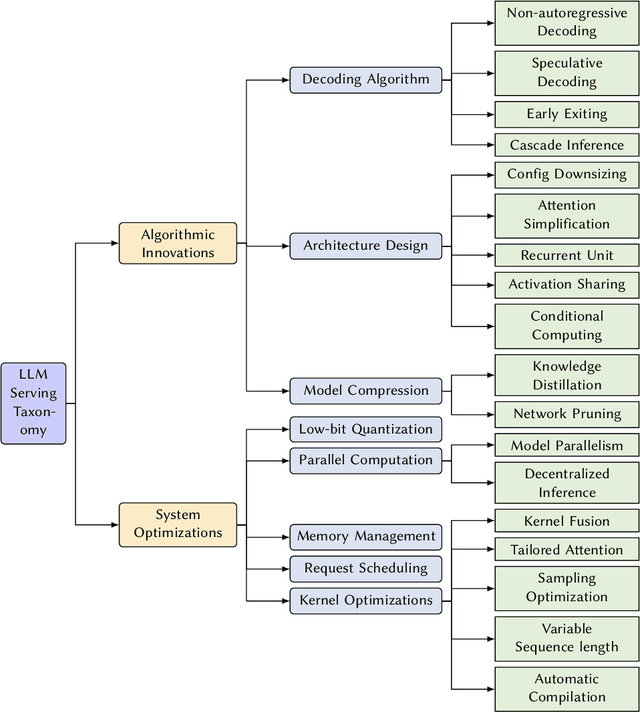

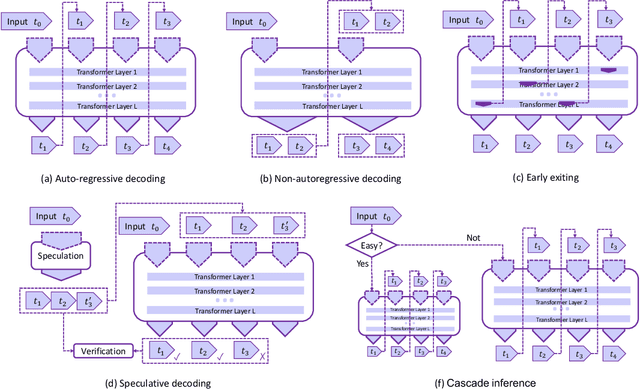

Abstract:In the rapidly evolving landscape of artificial intelligence (AI), generative large language models (LLMs) stand at the forefront, revolutionizing how we interact with our data. However, the computational intensity and memory consumption of deploying these models present substantial challenges in terms of serving efficiency, particularly in scenarios demanding low latency and high throughput. This survey addresses the imperative need for efficient LLM serving methodologies from a machine learning system (MLSys) research perspective, standing at the crux of advanced AI innovations and practical system optimizations. We provide in-depth analysis, covering a spectrum of solutions, ranging from cutting-edge algorithmic modifications to groundbreaking changes in system designs. The survey aims to provide a comprehensive understanding of the current state and future directions in efficient LLM serving, offering valuable insights for researchers and practitioners in overcoming the barriers of effective LLM deployment, thereby reshaping the future of AI.
Relax: Composable Abstractions for End-to-End Dynamic Machine Learning
Nov 01, 2023



Abstract:Dynamic shape computations have become critical in modern machine learning workloads, especially in emerging large language models. The success of these models has driven demand for deploying them to a diverse set of backend environments. In this paper, we present Relax, a compiler abstraction for optimizing end-to-end dynamic machine learning workloads. Relax introduces first-class symbolic shape annotations to track dynamic shape computations globally across the program. It also introduces a cross-level abstraction that encapsulates computational graphs, loop-level tensor programs, and library calls in a single representation to enable cross-level optimizations. We build an end-to-end compilation framework using the proposed approach to optimize dynamic shape models. Experimental results on large language models show that Relax delivers performance competitive with state-of-the-art hand-optimized systems across platforms and enables deployment of emerging dynamic models to a broader set of environments, including mobile phones, embedded devices, and web browsers.
TensorIR: An Abstraction for Automatic Tensorized Program Optimization
Jul 09, 2022
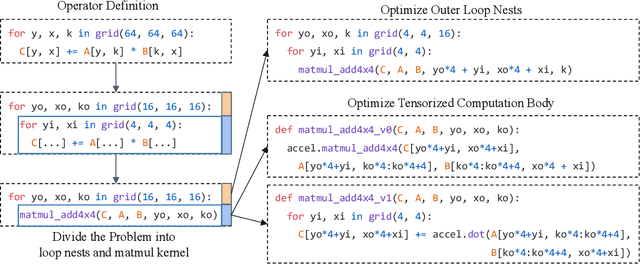


Abstract:Deploying deep learning models on various devices has become an important topic. The wave of hardware specialization brings a diverse set of acceleration primitives for multi-dimensional tensor computations. These new acceleration primitives, along with the emerging machine learning models, bring tremendous engineering challenges. In this paper, we present TensorIR, a compiler abstraction for optimizing programs with these tensor computation primitives. TensorIR generalizes the loop nest representation used in existing machine learning compilers to bring tensor computation as the first-class citizen. Finally, we build an end-to-end framework on top of our abstraction to automatically optimize deep learning models for given tensor computation primitives. Experimental results show that TensorIR compilation automatically uses the tensor computation primitives for given hardware backends and delivers performance that is competitive to state-of-art hand-optimized systems across platforms.
Tensor Program Optimization with Probabilistic Programs
May 26, 2022
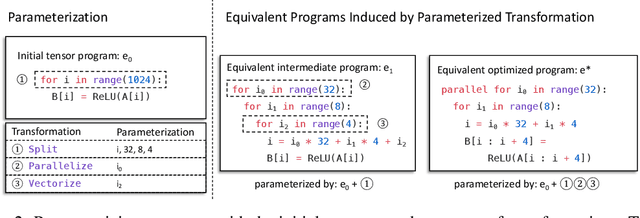
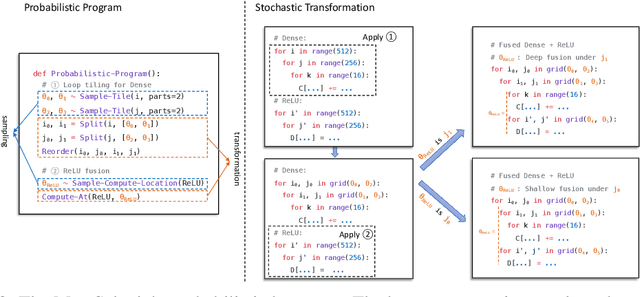

Abstract:Automatic optimization for tensor programs becomes increasingly important as we deploy deep learning in various environments, and efficient optimization relies on a rich search space and effective search. Most existing efforts adopt a search space which lacks the ability to efficiently enable domain experts to grow the search space. This paper introduces MetaSchedule, a domain-specific probabilistic programming language abstraction to construct a rich search space of tensor programs. Our abstraction allows domain experts to analyze the program, and easily propose stochastic choices in a modular way to compose program transformation accordingly. We also build an end-to-end learning-driven framework to find an optimized program for a given search space. Experimental results show that MetaSchedule can cover the search space used in the state-of-the-art tensor program optimization frameworks in a modular way. Additionally, it empowers domain experts to conveniently grow the search space and modularly enhance the system, which brings 48% speedup on end-to-end deep learning workloads.
 Add to Chrome
Add to Chrome Add to Firefox
Add to Firefox Add to Edge
Add to Edge